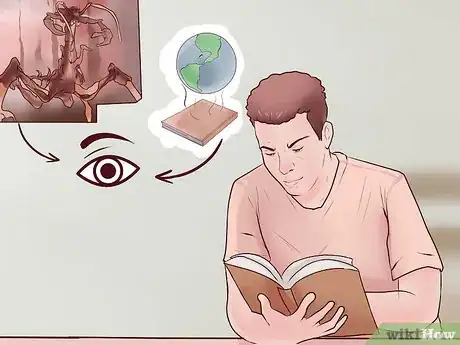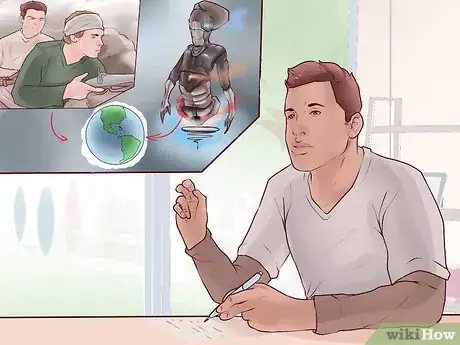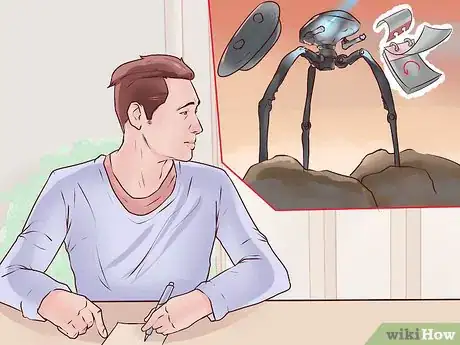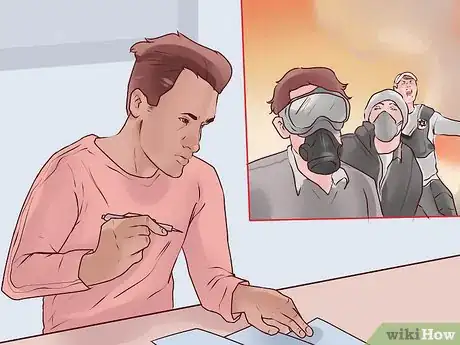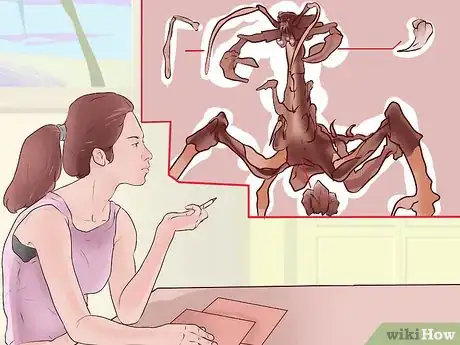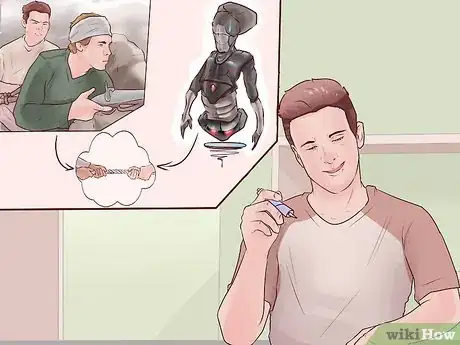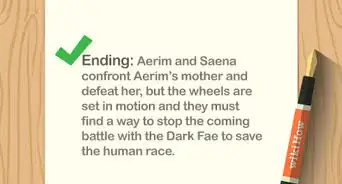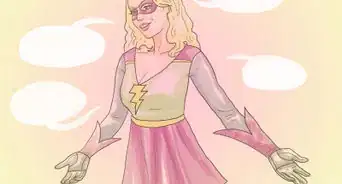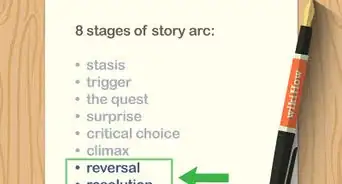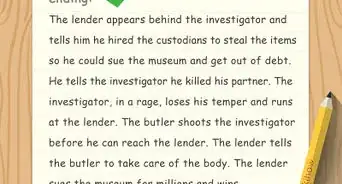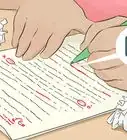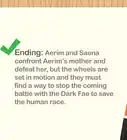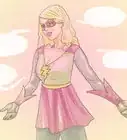This article was co-authored by Stephanie Wong Ken, MFA. Stephanie Wong Ken is a writer based in Canada. Stephanie's writing has appeared in Joyland, Catapult, Pithead Chapel, Cosmonaut's Avenue, and other publications. She holds an MFA in Fiction and Creative Writing from Portland State University.
This article has been viewed 76,808 times.
Alien sci-fi stories are fun to read, especially when they explore interesting settings and have nuanced characters. A good alien sci-fi story will also have alien characters with unique backstories and a clear goal. You can write your own alien sci-fi story by first determining the setting and creating your characters. Then, you can sit down to write a strong story.
Steps
Becoming Familiar with the Genre
-
1Learn about the role of aliens in a sci-fi story. Your alien sci-fi story could focus primarily on aliens and their perspective on the world. You may not have any humans in the story instead you, focus primarily on the alien point of view. Or, you may want to write an alien invasion story, where aliens invade the human world or even destroy it. Maybe try having the aliens battle the humans. Or have an alien and a human become friends in secret.
- Some alien sci-fi stories focus on the interaction between humans and aliens. Often, the aliens and the humans in the story are in conflict. Some sci-fi writers use the conflict between aliens and humans to then push the story forward and propel the plot of the story.
- Some of the best alien sci-fi will put the aliens front and center, creating aliens who have their own world, rules, and backstory. Often, the aliens will be just as prominent as the humans in the story, giving the reader two different perspectives on a conflict or issue.[1]
-
2Read examples of alien sci-fi stories. To get a better sense of this genre, you should read examples of alien sci-fi stories. Several examples include:[2]
- The War of the Worlds by H.G. Wells.
- Dawn by Octavia Butler.
- The Word for the World Is Forest by Ursula Le Guin.
- Dreamcatcher by Stephen King.
- Pandora’s Planet by Christopher Anvil.
Advertisement -
3Analyze the examples. Once you have read a few examples of alien sci-fi, you should analyze them. Consider how the author creates the alien world and the human world, if there is a human world in the story. Note how the author builds conflict and tension in the story. You may also compare and contrast a few examples to determine which approaches to the alien world you like better or find more engaging and entertaining.
- Ask yourself several questions, including: How does the author characterize the aliens in the story? How do the humans interact with the aliens? How does the story build tension and conflict? Does the ending of the story satisfy your curiosity as reader? Is the ending optimistic about aliens and humans interacting or is it more pessimistic and dark?
Creating the Story’s Setting
-
1Decide if the story is going to take place in the world of aliens or of humans. Most alien sci-fi stories take place in either the world of aliens or in the world of humans. There may be some flashbacks that provide detail about either world, but most stories stick to one setting. You may want to decide right away if your story is going to take place in alien world or human world.
- You may include details of either world in the story’s setting. For example, if your story is set the alien world, humans in the alien world may still remember their own customs and rituals. This would then allow you to show the reader the contrast between the alien customs and the human customs.
- You may also decide to have aliens who invade the human world, integrating their customs into the customs of the humans. The aliens may also bring their own rituals and try to impose them on humans.
-
2Build the physical world of the aliens. Start by outlining the basic details of the alien world, including the biology of their world and the basic infrastructure of their world. Consider several questions when building the physical world of the aliens:
- Is their world green, lush, and full of other species besides the aliens? Or is it foggy, cold, and dark? Maybe their planet contains multiple eco-systems or only one eco-system that is ideal for the alien race. Perhaps they subsist of a specific crop that only grows in certain areas of their planet.
- How do the aliens move around in their world? Do they fly in spaceships or have special clothing that allows them to jump and fly? You should also consider basic infrastructure elements like housing, food sources, energy storage and distribution, waste disposal, and the layout of the towns, cities, or neighborhoods in the alien world.
-
3Create a history of the alien world. Just like humans, the alien race will have their own historical events, such as times of war and times of prosperity. You should write down a history of the alien world to give the aliens some backstory.
- Consider several questions, such as: Did the aliens crash land on their planet and build it into a thriving metropolis? What were the major events of their history? For example, maybe their world is no longer inhabitable due to a natural disaster or genocide. Or maybe their world is prosperous and the envy of other planets in the galaxy.
- You should also think about different races within the alien world, such as aliens who are considered royalty or higher born and aliens who are considered servants or slaves. You should try to have a diverse range of social classes and backgrounds in the alien world, as this will make the aliens more distinct and varied.
-
4Outline the rituals and customs of the alien world. You should also consider the daily life of the aliens. This could include the rituals and customs of the alien world, from how the aliens wake up in the morning to how they worship their god or belief system. Going into these details will help you create a backstory for the aliens and make them seem more believable.
- You should determine the psychology among the alien world and consider how the rituals and customs in the alien world affects their beliefs and values. Maybe the aliens do not believe in eating other living beings and this means they do not raise animals or beings besides themselves on their planet. Or, maybe the aliens are a matriarchy, where females are in power. This could then affect their attitudes toward male aliens in the alien world.
- You may also consider how the aliens procreate, as the sexual lives of the species could be an important factor in their interactions with the human world in your story.
-
5Determine the characteristics of the human world. Your story may involve the world of humans as well as the world of aliens. Because you are writing an alien sci-fi story, the focus may be more on the alien world than the human world. But describing the human perspective can still be useful for building backstory.
- You should outline the physical world of the humans in your story as well as the history of the human world. Consider if the human world is suffering due to a disease, a plague, a natural disaster, or a man made disaster, such as nuclear war or civil war. Maybe a planet very similar to Earth has been destroyed and become uninhabitable, forcing humans to look at alien worlds to conquer and re settle.
- You should also consider the rituals and customs of the human world. Does the human world resemble our current world or does it focus on a specific area of the world? How do the humans use rituals and customs in their daily life? How does the human world differ from our current reality?
Outlining the Story’s Characters
-
1Describe the physical characteristics of the aliens. One of the key aspects of your alien characters should be how they look. To make your aliens seem convincing and interesting, you should try to be as detailed about their physical characteristics as you can. Because you are writing fiction, you have the ability to create as many strange and interesting details about your alien characters as you like. Avoid using familiar images or descriptions of aliens and use your imagination.[3]
- Think about how the aliens walk and move their bodies. You should also think about how their bodies are proportioned. They do not necessarily need to walk on two legs and have limbs like humans. They may have physical characteristics that have evolved due to their world or environment. For example, maybe your aliens have antennas on their heads because they can feel shifts in the wind in their world, allowing them to hunt for food more effectively.
- You should also think about whether there are different genders in the alien world and how the bodies of different genders appear. You do not have to be limited by male or female genders. Maybe the alien race has a third gender that is asexual or a combination of male and female genders.
-
2Create an alien language or way of communicating. Avoid creating the alien characters in the shadow of humans and get creative with language, thinking beyond English or other languages found on Earth. You may decide to create an alien language that may then be translated with the help of a computerized device or an implant in the human brain.[4]
- Your alien race may also communicate in other ways besides language or words. Maybe they use their antennas to send messages to each other or have the ability to communicate through telepathy. Perhaps they use a system of body movements to communicate.
-
3Give the human characters special abilities and unique characteristics. The humans in your story may also be key characters in the narrative, so you should create humans that are just as interesting as the aliens. Your main character may be a human with a special ability or a unique characteristic. Creating nuanced humans in your story will make it that much stronger.[5]
- For example, maybe your main character is a human who has been gifted with the ability to read minds. This human is then able to access the conversations of the alien overlords, who have enslaved the human race. This ability could allow the human to save the humans from the aliens and become the hero of the story.
-
4Determine the central conflict of the story. Once you have sketched out your characters, you should identify the central conflict. Doing this will give the story an end goal and frame the narrative for the reader. It will also allow you to use your characters to build tension in the story. The central conflict may be between your alien characters or between an alien character and a human character.
- For example, maybe the central conflict of your story is that aliens have taken over the human world because their planet is no longer habitable. This alien invasion may then result in a human hero who tries to fight the aliens with a special ability and help from other humans in his community. Or, maybe the central conflict is that humans have enslaved aliens who have crash landed on their planet. The humans may then try to hide the aliens and experiment on them. This may then result in one alien who tries to oppose his human captors.
Writing a First Draft
-
1Make a plot outline. Sit down and sketch out how your story is going to unfold. You may use a plot diagram to make the outline or use the snowflake method. Regardless of which method you use, your plot should have a central conflict and a climax or high point of the narrative. You should also focus on building tension in the story so your reader stays engaged and continues turning the page.
- You should also make sure you are keeping in mind how aliens and humans are interacting in your story. The humans and the aliens should be playing off each other, creating tension and conflict as the story unfolds. The interests of the humans should also be in opposition to the interest of the aliens, as this will ensure they are always in conflict with each other.
-
2Avoid cliche descriptions. Alien sci-fi can be littered with cliches, or descriptions so familiar they lose their meaning or relevance. Cliches like “little green men”, “alien invasion” and “UFOs found in the woods on a foggy night” should be avoided. Instead, try to create descriptions that will feel unfamiliar and surprising to the reader. Whenever you feel a phrase or term is too well known, try to change it so it does not fall into cliche.
- For example, you may describe the alien species as “having a wide head with bulbous eyes and a pair of thin antennas that twitched with energy.” This description is detailed and clear without using cliched images. You may also describe UFOs as “flying dinner plates” or “gray ships in the sky” and avoid using the term “UFO” altogether to try to make the reader less familiar with the storyline.
-
3Integrate science into the story. Unlike other genres, science fiction should lean on elements of real world science to create a believable fictional world. Your story should integrate science that contain fundamental science, such as technology, chemistry, biology, or advanced scientific ideas. Your reader should be able to think elements of the story could be possible, at least scientifically speaking.
- You may want to do research around a specific scientific concept and try to integrate it into your story. For example, maybe your alien race has found a way to time travel using spacetime and the theory of relativity. You may then describe the alien’s approach to spacetime, using the principles of spacetime in science.
-
4Read your first draft out loud. Do this in front of a mirror at home and record yourself as you read. Or, read your draft in front of a sympathetic audience. You can then listen to yourself read the story and note any sentences or phrases that sounded wordy or unclear. You may also solicit feedback from your audience by asking questions about whether they found the story exciting or engaging and where they felt the story dipped in terms of energy and pacing.
- You should then go back and edit your first draft. Revise any sentences that sound wordy or unclear. Break up long-winded sentences so they are more concise and to the point.
- If there are any confusing moments in terms of plot or character development, you should also clarify these areas in the story. You may need to rewrite certain sections of the stories so plot and character are stronger on the page.
Community Q&A
-
QuestionI was thinking of doing a spin on The War of the Worlds by H. G Wells where the aliens are the protagonists. Do you think this would be a fun read?
 DonaganTop AnswererIt could very well be an interesting read, but most people enjoy reading relatable fiction, and it might be hard to relate to (assume the position of) aliens. A skilled writer might be able to make that possible.
DonaganTop AnswererIt could very well be an interesting read, but most people enjoy reading relatable fiction, and it might be hard to relate to (assume the position of) aliens. A skilled writer might be able to make that possible. -
QuestionCan I write an erotic sci-fi story and turn it in as a school project?
 Community AnswerI would recommend no as you could get into trouble if you hand it in to your teacher.
Community AnswerI would recommend no as you could get into trouble if you hand it in to your teacher. -
QuestionWhat kind of ending is most preferable?
 Community AnswerIf you’re planning a sequel, write the ending so that the sequel could take place after the first book. If it’s an on earth book, try to make an unexpected ending, or one in which one of the sides win.
Community AnswerIf you’re planning a sequel, write the ending so that the sequel could take place after the first book. If it’s an on earth book, try to make an unexpected ending, or one in which one of the sides win.
References
- ↑ http://best-sci-fi-books.com/29-best-alien-invasion-science-fiction-books/
- ↑ http://best-sci-fi-books.com/29-best-alien-invasion-science-fiction-books/
- ↑ http://www.veronicasicoe.com/blog/2012/04/13-aspects-about-aliens-you-shouldnt-ignore/
- ↑ http://www.writepop.com/writing/writing-realistic-aliens
- ↑ http://www.writepop.com/writing/writing-realistic-aliens
